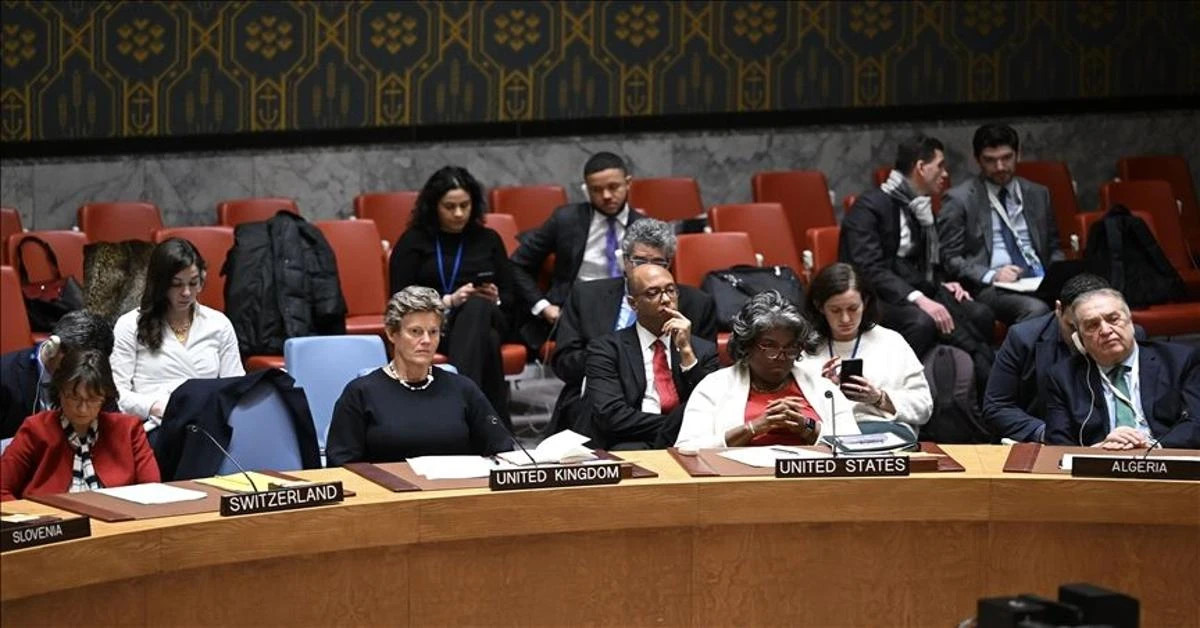UN Security Council gathers to address ICJ ruling on Israel

The decision ‘reaffirms’ that the time of impunity has come to an end, says Algeria’s permanent representative to the U.N.
In a bid to review a recent provisional ruling of the International Court of Justice (ICJ) on Israel, UN Security Council (UNSC) member states gathered to voice their concerns Wednesday.
The Hague-based ICJ ordered Israel last week to “take all measures within its power” to prevent further bloodshed in Gaza in line with its obligations under the 1948 Genocide Convention. The court also demanded the immediate release of all hostages.
South Africa brought the genocide case against Israel to the ICJ in late December and asked it to grant emergency measures to end the bloodshed in Gaza, where at least 26,900 Palestinians have been killed since Oct. 7.
It ordered Israel to take “immediate and effective” measures to enable the provision of urgently needed services and humanitarian assistance in Gaza but fell short of ordering a cease-fire.
Amar Bendjama, Algeria’s permanent representative to the U.N., said the decision “reaffirms” that the time of impunity has come to an end.
“We in this connection reaffirm that Israel, the occupying power, immediately comply with the measures agreed upon by the Court.
“It is incumbent upon the international community to ensure that Israel fully complies with those provisional measures,” Bendjama told the Council’s meeting on the situation in the Middle East, including the Palestinian question.
“It is of the utmost importance to guarantee accountability to protect future generations from atrocities such as those being committed today in Gaza,” he said, stressing that the provisional measures imposed by the U.N. World Court must be implemented to protect Palestinian people from genocide.
Barbara Woodward, the U.K.’s permanent representative to the U.N., said the U.K. welcomed the ICJ’s call for the immediate release of hostages and the need to get more aid into Gaza, “as well as the Court’s reminder that all parties to the conflict are bound by international humanitarian law.”
‘Bounty exists on the head of every Palestinian’
Guyana’s permanent representative to the U.N., Carolyn Rodrigues-Birkett, said her country remains “deeply concerned” about the prevailing humanitarian situation and the continued death and destruction that have enveloped the landscape of Gaza.
“Following developments in the war…one may be moved to wonder whether a bounty exists on the head of every Palestinian child, man and woman,” she said.
“Many who managed to escape bombs and bullets face a dire prospect of death by starvation.”
China’s Ambassador Zhang Jun reiterated his call for a cease-fire in Gaza and said the humanitarian disaster is “still intensifying.”
The ICJ’s provisional measures are a “strong response” to the need to protect civilians, he said, adding that China calls for greater diplomatic efforts and an international conference on peace, together with Palestine’s full membership in the U.N.
Russia “consistently and steadfastly” advocates for an immediate humanitarian cease-fire, Ambassador Vassily Nebenzia said
The spiral of violence in Gaza will continue until the “long-standing injustice” underlying the conflict has been eliminated and the Palestinian people can realize the right to create their independent state, he added.
US Ambassador Linda Thomas-Greenfield said the ICJ’s provisional measures order is in line with the US delegation’s belief that Israel has a right to defend itself, but how it does so matters, and all operations are bound to respect international humanitarian law.
“While we all agree more must be done – and though we are all broken by the extraordinary loss of civilian lives – we must be honest about what the Court did not order. Specifically, it has not ordered an immediate cease-fire,” she said.
Palestine’s envoy to the U.N. Riyad Mansour said it is “crystal clear” that the provisional measures adopted by the ICJ are binding and Israel must comply with them.
“The Court also dismissed the premise that somehow Israel would be above the law and could not be accused of committing the crime of genocide,” he added.
Mansour called on everyone to “concentrate” on the provisional measures adopted by the Court, urging them to “read them, study them, and re-read” them to know what the measures are, and not on “the illusions in the minds of some, of what is not in it.”
South African Ambassador Mathu Joyini said the measures are “directly binding” on Israel.
“The decision by the court marks a decisive victory for the international rule of law and a significant milestone in the search for justice for the Palestinian people,” she said.
Source: AA



